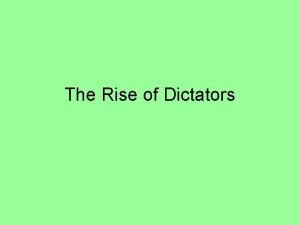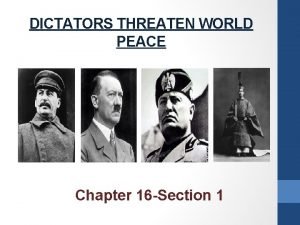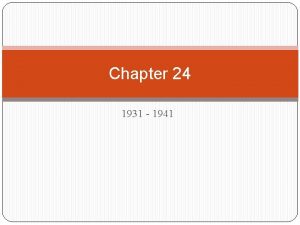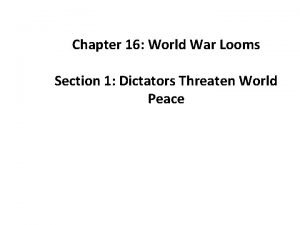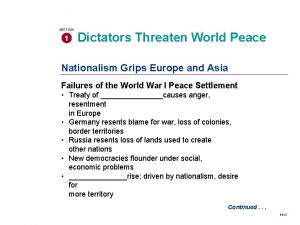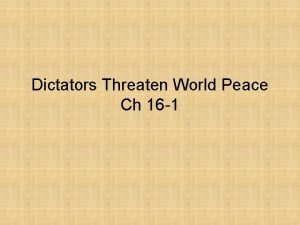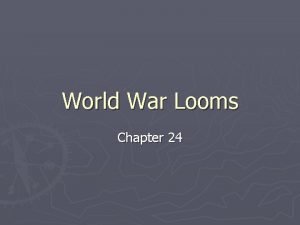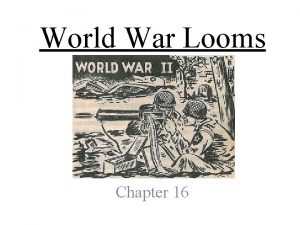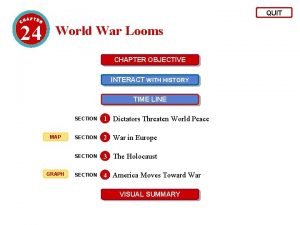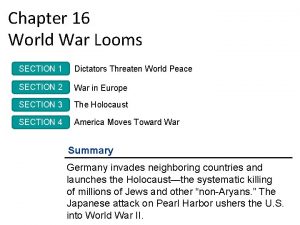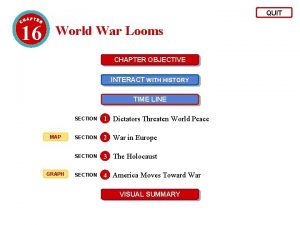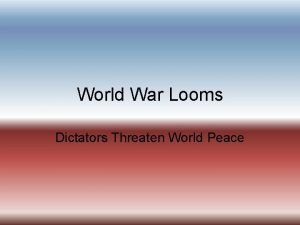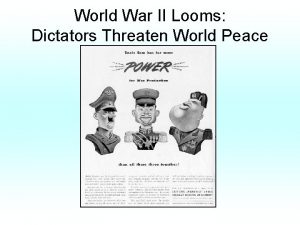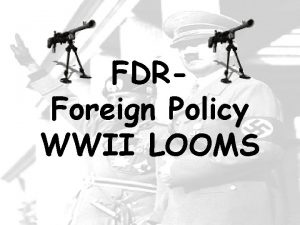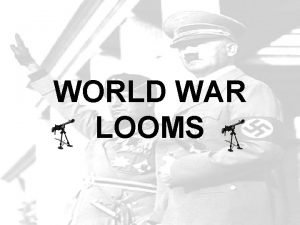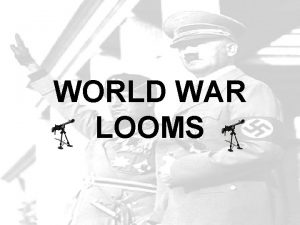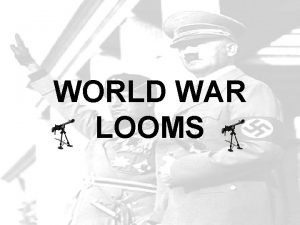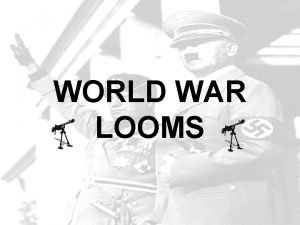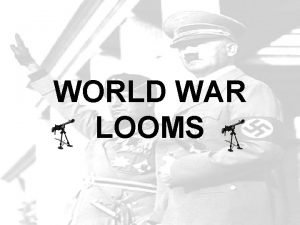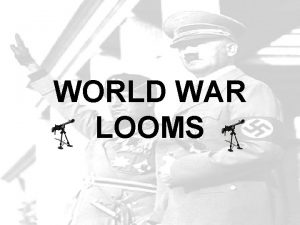World War II Looms Dictators Threaten World Peace











- Slides: 11

World War II Looms: Dictators Threaten World Peace (Part 2)

Aggressive Actions of the 20 s-30 s Adolf Hitler Nation: Germany Political System: Nazism Political Movement and Beliefs: • *extreme nationalism and racism • * militaristic expansionism • * authoritarian government • *private property allowed • *Establishes the Third Reich (dissolves Weimar Republic) • * Pulls out of the League of Nations • * Built up the military (violating T. of V. ) • *Sends troops to the Rhineland= the buffer zone (violating T. of V) • *Forms Rome-Berlin Axis Pact with Mussolini • *Sets himself up as the Fuhrer • *Passes Nuremburg Laws (revoking Jewish citizenship and enacting “anti -miscegenation” laws) • *Orders Kristallnacht and other pogroms (regarded by many as the beginning of the Holocaust) • Invades Poland, 1939 • * anti-communism



Japanese Militarist/Imperialists Hideki Tojo, Prime Minister of Japan Political Movement and Beliefs: • *extreme nationalism and racism Nation: Japan Political System: Militarism Aggressive Actions of the 20 s 30 s • *Invades Manchuria (1931) • * Militaristic expansionism • *Japan’s destiny is to rule over an empire, deification of emperor, despite limited power (samurai/shogun tradition) – Exploit natural resources – -Establish sites of heavy industry for Japanese economic expansion – Sets up puppet state of Manchu Guo • * Pulls out of League of Nations (1931) • * Invades China (1937) – Rape of Nanking • *Would invade most of S. E. Asia leading up to, and during the war


Francisco Franco Nation: Spain Political System: Militarism Political Movement and Beliefs: • *Fascism • *Militarism • * Strong nationalism Aggressive Actions of the 20 s and 30 s: • *Anti-Communism • * Participated in an uprising against the elected government • * Emerged leader of the Nationalists during the Spanish Civil War • * Dissolved the Spanish Parliament

Terms • Totalitarian: A government where citizens have no individual rights and where all opposition is put down • Neutrality Acts: Laws passed by Congress in 1935 to ban the sales of weapons/arms or loans to nations at war (passed in response to Spanish civil war)

United States Foreign Policy During the 1930 s • • • Recognized Soviet Union in 1933 (exchanged ambassadors with Moscow) Continuation of “Good Neighbor Policy” (started under Coolidge and continued by Hoover – focus on non-intervention and repairing relations with Latin American countries) 1934 Reciprocal Trade Agreement Act (gave President more power to make trade agreements with countries and lowered tariffs by 50%) Anti-War sentiment was a strong prevailing belief among large segment of American population. Many opposed it because of hatred for banks and industrialists who had profited enormously from WWI. Made it very difficult for Roosevelt to even support other Western democracies against European and Japanese aggressors, let alone join with others against them.


Isolationism gives way to a questioning of neutrality… • Americans sympathized with many beleaguered Europeans living under the rule of dictators. Many had already pledged themselves to fight in Spain and East Africa as part of special volunteer battalions • Many elements of similar racism and oppression existed in the U. S. at the same time (anti-Semitism, racial purity and eugenics theories based on Darwinism) • Churchill’s observations of Hitler and his conviction that another world war would be unavoidable finally began to persuade Roosevelt to throw his weight behind support for the Allied side in the coming war, even if the U. S. declined to become directly involved as a combatant…. . which of course, by December 1941, they inevitably would.
 Types of dictatorship
Types of dictatorship Chapter 16 dictators threaten world peace
Chapter 16 dictators threaten world peace Chapter 24 world war looms section 1 answers
Chapter 24 world war looms section 1 answers Dictators threaten world peace
Dictators threaten world peace Dictators threaten world peace chapter 24 section 1 answers
Dictators threaten world peace chapter 24 section 1 answers Dictators threaten world peace
Dictators threaten world peace Chapter 16 section 1 dictators threaten world peace
Chapter 16 section 1 dictators threaten world peace Gbyeg
Gbyeg Chapter 16 building vocabulary world war looms
Chapter 16 building vocabulary world war looms Chapter 24 world war looms section 1 answers
Chapter 24 world war looms section 1 answers Chapter 16 building vocabulary world war looms
Chapter 16 building vocabulary world war looms Chapter 16 world war looms answer key
Chapter 16 world war looms answer key
